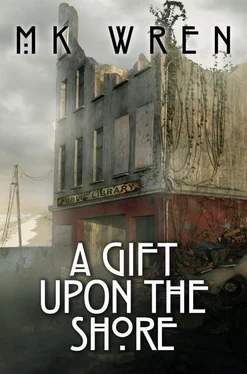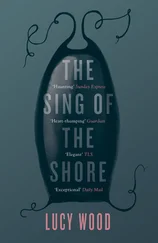“I’m fine,” he replies absently, eyeing the open book. “What’s that you’re reading?”
“Emily Dickinson. We haven’t studied any of her poems in school yet, but we will.” I offer him the book. “Would you like a preview?”
“Yes, I’d like that.”
“Take it, then. Oh—I’ll need it tomorrow. Mary wanted to know about Emily Dickinson. Maybe you could read it with her in the evening. She needs some extra help with her reading.”
He seems pleased at that. “I’ll help her anytime she wants. Why was she interested in this woman?”
“Because of our cat. I hadn’t thought about the names of the animals as teaching aids. Now I’m waiting for someone to ask about Falstaff.” Then I add: “But our Emily isn’t the first of the pets here named after Emily Dickinson. Rachel and I named Shadow’s first pup Emily.”
He leans forward, arms folded on the table, and I am again gratified to see the glint of curiosity in his black eyes. “When did Shadow have her first litter?”
“In November, about two months after the End. She had a litter of five, but only three were bom alive.” The gray of the sky seems to turn melancholy with the memory. “One pup looked perfect, but it was born dead. The other was pitifully malformed—stubs of legs, not even slits over its eyes. I buried them next to Topaz. I took a flashlight and a shovel and went out into a howling night and dug through the snow into the frozen earth. And that wasn’t the last grave I dug for the pups. Even our little Emily died that winter. None of the first litter survived.”
“Oh.” He lets his breath out in a sigh. “Can you… would you mind telling me about the Long Winter?”
The Long Winter. Luke called it that. I don’t think Rachel and I had a name for it, other than nuclear winter. Or simply, with a little emphasis on the article, the winter.
I lean back, look out at the beaded curtains of warm, greening rain. “Yes, I’ll tell you about it, Stephen. It’s part of the Chronicle.” “When are you going to start writing it?”
I touch the small, black portfolio on the table. “I’ve already begun. At night, while you’re sound asleep. Only a few pages so far.” Too few. My time is getting short.
“Can I read it?”
“When I’ve finished, yes. I’m writing it for you, Stephen.” I don’t give him time to question that. “The Long Winter. Well, it was bitterly, miserably cold, a constant twilight in the daytime, starless and moonless black at night, and the air smelled like… rotten smoke. It was…”
He waits for me to go on, then: “What, Mary?”
“Terrible. Terrifying.” I reach for the diary on the table, but keep it closed for now. “We had to live in the basement. I still don’t like to go down there, although Esther and Miriam have made it very pleasant. And we wouldn’t have survived without it or without the extra provisions and supplies we’d bought. Or without scavenging. Looting. We went to the houses near us that hadn’t been burned, and we looted them of food, tools, clothing, medicine—anything that might be useful. Of course, Rachel always took any books she found.”
“That’s not really looting,” Stephen objects. I mean, you weren’t stealing from people.”
“No. There was no one to steal from. Not around here.”
“What happened to them?”
“Some were killed in the fires and road gang attacks immediately after the End. Some died of the cold. And some of those who lived through the first weeks joined in groups in the hope that they could better survive together, like at the Greenly farm. It was about five miles up the Coho River. Rachel used to trade rabbits and honey for Aldo Greenly’s hay. She said if anyone could survive, it would be Aldo Greenly. He’d made a career of hardy subsistence.”
Stephen asks hesitantly, “But he… didn’t survive?”
“No.” I shake my head slowly. “Nor his wife, his two sons, and their wives and children. Nor the other two families that had moved in with them. One of them brought Lassa to the farm.”
“It really was a plague, wasn’t it?”
“Well, it certainly was here. Maybe there were places it hadn’t reached before the End. I don’t know. I’ll never know. There’s so much I’ll never know.”
“Maybe someday…” But he seems to recognize the unlikelihood of such a someday. “When did you and Rachel go to the Greenly farm?”
“Not until November. I wanted to go before that. I was sure we’d find survivors there, but a trek of ten miles round-trip had become an expedition. The weather was so hellish. The storms that came in off the ocean were vicious, half hurricanes, half blizzards. Some days we couldn’t even get to the barn, not until we rigged guide ropes. Between storms, we went scavenging, but even on one of those trips, we nearly got lost when a storm came up suddenly. Both of us had frostbite.”
“I think you and Rachel were brave to leave Amarna at all.”
I shrug. “I guess we didn’t think we had much choice. We were afraid the food and clothing, even the metal tools that would rust, might be ruined before we found them. And… we had to get out of that cave when we could, or we’d have gone insane.”
He nods, although I doubt he understands how close we were to insanity then. “Did you have a hard time getting to the Greenly farm?”
“No. We were lucky with the weather that day. I mean, we weren’t overtaken by a blizzard. But when we reached the farm… well, we found two bodies in the house and a graveyard near the barn. Twenty wooden markers with names painted on them.” I close my eyes, remembering that little graveyard, remembering my tears. Someone had cared for the people buried under those snowy mounds, and one by one, day by day—all the markers had dates—there were fewer to care for the living or the dead. And I knew then that the world was full of such graveyards, where love and hope were buried in relentless grief until the last griever died.
I open my eyes to the gentle, gray rain. “We owe Aldo Greenly a great deal. We found a root cellar full of home-canned food. And three Saanen goats, some Plymouth Rock chickens, two sows, and a boar. Aldo raised quarter horses, too, but we didn’t find any of them that first trip. But we found tack and saddles and tools—we’re still using some of them—and seed and chicken feed. And hay. The loft of the barn was full. And the two-wheeled utility cart. It was designed to be pulled by a tractor, but we adjusted it for Silver. Oh—we found three half-starved kittens. Anyway, the first Greenly expedition was… well, I can’t call it a success, not when I remember that graveyard.”
I pause, look at Stephen, who listens sympathetically. Yet there is nothing in his experience that would make it possible for him to imagine the despair that haunted us in our search for other survivors, nor that perverse mix of hope and fear we felt when we approached a place where we thought we might find survivors: hope that we’d find people alive, that they might have some contact with the rest of the human race; fear that they might be less than benevolent or sane, that they might kill first and wonder about us later. We had a horse, wagon, guns; throughout history, people have been murdered for less.
And Stephen can’t imagine the loneliness that accumulated around us every time our hopes were dashed. We didn’t believe we were the only survivors in the world. If we had survived, others would. Somewhere. But not here, and we began to wonder if we’d ever see another living human being. That kind of loneliness is beyond imagining, and it seemed then beyond enduring.
Stephen says earnestly, “It’s sad to have to live off other people’s misfortune, but you and Rachel never harmed anybody.”
Читать дальше












